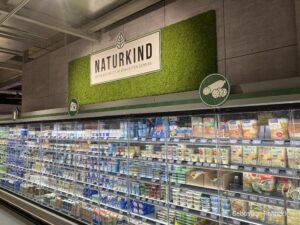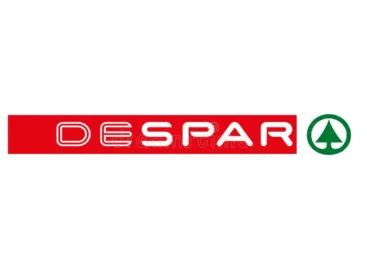Aldi and Edeka fight for the crown of largest organic grocer
German grocers expand their organic ranges. Discounters and supermarkets alike step up their cooperation with associations for organic farming. Segment leader Alnatura’s introduction of an organic price-entry private label fuels own brand development across the whole retail sector.

Edeka has installed ‘Naturkind’ shop-in-shop concepts in selected stores
Discounter Aldi and supermarket operator Edeka are going head-to-head for the top spot in Germany’s organic retail segment. Aldi claims to generate most sales with organic products, citing sales data from Nielsen. Edeka, on the other hand, sees itself as the market leader in this segment, citing market research from GfK.
In 2023, the Edeka Group has expanded its organic private label Edeka Bio to 485 items, reports German Lebensmittel Zeitung. In the current year, Edeka intends to further expand its private label range in this segment. Including branded products, Edeka Südwest, one of the seven regional Edeka entities across Germany that is in direct competition with Aldi Süd, offers an average of 3,600 organic products.
Aldi Süd indicates around 600 organic items in 2023, counting standard ranges, seasonal and promotional items. Last year, Aldi Süd launched its own organic brand ‘Nur Nur Natur’ in addition to its existing organic range ‘Gut Bio’. According to the retailer, ‘Nur Nur Natur’ has doubled its share in the discounter’s total sales since the beginning of 2024.
‘Organic Plus’ becomes the standard
Although German retailers rely heavily on their own brands in the organic segment, each of the major grocers also works with organic food associations whose certification standards exceed the EU’s minimum requirements.
Aldi Süd and Aldi Nord have both been working with the Naturland association since 2023, as has Rewe Group’s discount banner Penny, that also started cooperation from last year. Penny’s sister brand Rewe supermarkets has been working with Naturland for more than 15 years. Discounter Lidl, in contrast, has already listed Bioland as a cooperation partner in 2018, as has its sister company Kaufland.
Edeka stores not only offer the widest range of organic products. Over the past four years, Edeka has added one organic farming association per year to its assortment. From 2020 the retailer works with Demeter, from 2021 with Bioland, from 2022 with Naturland and from 2023 with Biokreis. To further strengthen its organic credentials and tap into the customer base of existing organic specialist stores such as Alnatura or Denns Biomarkt, Edeka launched its ‘Naturkind’ shop-in-shop organic concept world in 2022 and also has opened individual organic stores of the same name across Germany.
Segment leader Alnatura creates own price-entry private label
Organic products have not only become a strategic area for discounters to poach more affluent customer segments from supermarket competitors. Cost pressure at organic segment leader Alnatura have made the development of private labels more viable for other grocers. Alnatura operates a network of company stores and in its wholesaler function also sells the ‘Alnatura’ brand products to retailers such as Edeka and Rewe. As a response to the negative sales dynamics in 2022, Alnatura had introduced a new price entry level in 2023 under the label ‘Prima! Alnatura’. However, the retailer has only made this low-cost option available in its own stores, not to other retail partners. As a result, many general grocers have increased their private label development in the segment.
Market research company GfK estimates that sales of organic food and beverages in Germany have declined by 4% in 2022. According to market surveys, consumers are switching from organic brands to cheaper alternatives such as general grocers’ own brands.
Related news
Retail sales of organic products in Hungary increased by 13.9% – our country is the second fastest growing market in the European Union
🎧 Hallgasd a cikket: Lejátszás Szünet Folytatás Leállítás Nyelv: Auto…
Read more >Related news
Change in Rossmann Hungary’s leadership: Kornél Németh decided to move towards new challenges in 2026
🎧 Hallgasd a cikket: Lejátszás Szünet Folytatás Leállítás Nyelv: Auto…
Read more >









